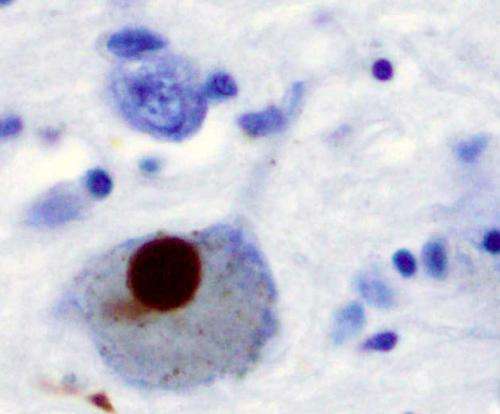Promising molecule targets protein to offer hope for people with Parkinson's

Results from a study published today looking at a molecule targeting clumps of alpha-synuclein, a key protein linked to Parkinson's, offers hope that it may be possible to slow down or prevent the progression of the condition in humans.
Researchers at the University of Cambridge have been able to investigate the effect of a molecule called anle138b, by developing a new mouse model of Parkinson's.
Funded by the charity Parkinson's UK, the study looked at the effect of anle138b on the accumulation of alpha-synuclein, a protein known to form sticky clumps, known as Lewy bodies, in the brain. These clumps are associated with the death of nerve cells responsible for producing the chemical dopamine, which allows messages to be sent to the parts of the brain that help co-ordinate movement. This causes the motor symptoms associated with Parkinson's, including freezing, tremors and slowness of movement.
Anle138b has previously been shown to reduce the clumping of proteins in neurodegenerative conditions, including other Parkinson's models. To further study the potential of the molecule for treating the condition, researchers created a new mouse model of Parkinson's that mimics the way alpha-synuclein gradually accumulates specifically in areas of the brain typically affected by the condition.
At nine-months-old, without treatment, the levels of dopamine in the mouse model brains were already reduced. This reduction was associated with the onset of symptoms, including a subtle change in gait that mimicked some of the early motor symptoms seen in people with Parkinson's—such as the 'shuffling' of feet when walking.
When the mice were treated for three months with anle138b, starting at nine-months-old, before significant nerve cell loss had occurred, researchers observed a reduction in alpha-synuclein clumps, restored levels of dopamine in the brain and protection against nerve cell death. This was accompanied by an improvement to the gait of the mice, effectively reversing several of the Parkinson's like motor symptoms.
These promising results published in Acta Neuropathologica today, suggest that if anle138b is given early on before consistent nerve cell death, it can reduce the dense clumping of the alpha-synuclein aggregates, potentially stopping Parkinson's in its tracks.
Lead Researcher, Professor Maria Grazia Spillantini of the Department of Clinical Neurosciences, University of Cambridge, said: "Our study demonstrates that by affecting early alpha-synuclein aggregation with the molecule anle138b in a novel transgenic mouse model, one can rescue the dopaminergic dysfunction and motor features that are typical of Parkinson's.
"By using super resolution microscopy, we have been able to see how the compound acts in the brain of the mouse to achieve this effect. This work opens the way for the development of new mechanism-based therapies for Parkinson's and related disorders."
Dr. Beckie Port, Research Manager at Parkinson's UK, said: "The evidence from this early stage study builds on our understanding of how alpha-synuclein is involved in Parkinson's and provides a new model that could unlock future treatments.
"Additionally, the discovery that targeting alpha-synuclein aggregation early on can restore dopamine levels and rescue cells may prove to be crucial in stopping Parkinson's in its tracks.
"Today, we have no treatments that can slow or stop the progression of Parkinson's. It is vital we continue to support world-leading academics, like those in Cambridge, and ensure results like these are turned into future treatments that are so desperately needed for the 1 in 37 of us that will be diagnosed in our lifetime."
More information: Michal Wegrzynowicz et al, Depopulation of dense α-synuclein aggregates is associated with rescue of dopamine neuron dysfunction and death in a new Parkinson's disease model, Acta Neuropathologica (2019). DOI: 10.1007/s00401-019-02023-x

















